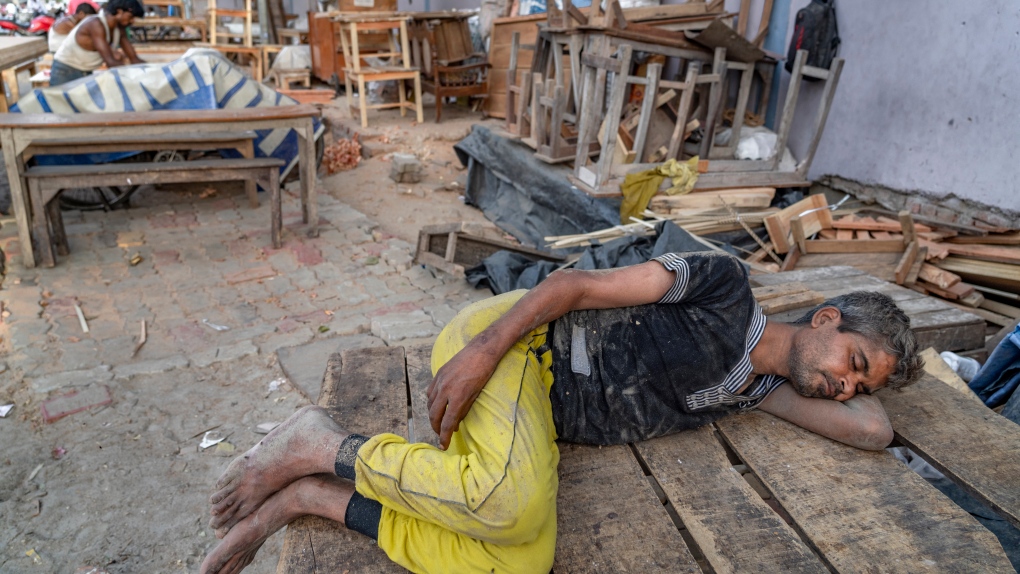NEW DELHI -
The devastating heat wave that has baked India and Pakistan in recent months was made more likely by climate change and is a glimpse of the region's future, international scientists said in a study released Monday.
The World Weather Attribution group analyzed historical weather data that suggested early, long heat waves that impact a massive geographical area are rare, once-a-century events. But the current level of global warming, caused by human-caused climate change, has made those heat waves 30 times more likely.
If global heating increases to 2 degrees Celsius (3.6 degrees Fahrenheit) more than pre-industrial levels, then heat waves like this could occur twice in a century and up to once every five years, said Arpita Mondal, a climate scientist at the Indian Institute of Technology in Mumbai, who was part of the study.
"This is a sign of things to come," Mondal said.
The results are conservative: An analysis published last week by the United Kingdom's Meteorological Office said the heat wave was probably made 100 times more likely by climate change, with such scorching temperatures likely to reoccur every three years.
The World Weather Attribution analysis is different as it is trying to calculate how specific aspects of the heat wave, such as the length and the region impacted, were made more likely by global warming. "The real result is probably somewhere between ours and the (U.K.) Met Office result for how much climate change increased this event," said Friederike Otto, a climate scientist at the Imperial College of London, who was also a part of the study.
What is certain, though, is the devastation the heat wave has wreaked. Indian cities and Pakistan consistently saw temperatures above 45C (113F) in the past weeks. In Pakistan, scorching temperatures over 50C (122F) were recorded in some places like Jacobabad and Dadu. Parts of the Indian capital New Delhi saw temperatures reaching 49C (120F) this month.
India sweltered through the hottest March in the country since records began in 1901 and April was the warmest on record in Pakistan and parts of India. The effects have been cascading and widespread: A glacier burst in Pakistan, sending floods downstream; the early heat scorched wheat crops in India, forcing it to ban exports to nations reeling from food shortages due to Russia's war in Ukraine; it also resulted in an early spike in electricity demand in India that depleted coal reserves, resulting in acute power shortages affecting millions.
Then there is the impact on human health. At least 90 people have died in the two nations, but the region's insufficient death registration means that this is likely an undercount. South Asia is the most affected by heat stress, according to an analysis by The Associated Press of a dataset published Columbia University's climate school. India alone is home to more than a third of the world's population that lives in areas where extreme heat is rising.
Experts agree the heat wave underscores the need for the world to not just combat climate change by cutting down greenhouse gas emissions, but to also adapt to its harmful impacts as quickly as possible. Children and the elderly are most at risk from heat stress, but its impact is also inordinately bigger for the poor who may not have access to cooling or water and often live in crowded slums that are hotter than leafier, wealthier neighbourhoods.
Rahman Ali, 42, a ragpicker in an eastern suburb of the Indian capital New Delhi earns less than US$3 a day by collecting waste from people's homes and sorting it to salvage whatever can be sold. It's backbreaking work and his tin-roofed home in the crowded slum offers little respite from the heat.
"What can we do? If I don't work...we won't eat," said the father of two.
Some Indian cities have tried to find solutions. The western city of Ahmedabad was the first in South Asia to design a heat wave plan for its population of over 8.4 million, all the way back in 2013. The plan includes an early warning system that tells health workers and residents to prepare for heat waves, empowers administrations to keep parks open so that people can shade and provides information to schools so they're able to tweak their schedules.
The city has also been trying to "cool" roofs by experimenting with various materials absorb heat differently. Their aim is to build roofs that'll reflect the sun and bring down indoor temperatures by using white, reflective paint or cheaper materials like dried grass, said Dr. Dileep Mavalankar, who heads the Indian Institute of Public Health in western Indian city Gandhinagar and helped design the 2013 plan.
Most Indian cities are less prepared and India's federal government is now working with 130 cities in 23 heat wave-prone states for them to develop similar plans. Earlier this month, the federal government also asked states to sensitize health workers on managing heat-related illnesses and ensure that ice packs, oral rehydration salts, and cooling appliances in hospitals were available.
But Mavalankar, who wasn't part of the study, pointed to the lack of government warnings in newspapers or TV for most Indian cities and said that local administrations had just not "woken up to the heat."
------
The Associated Press Health and Science Department receives support from the Howard Hughes Medical Institute's Department of Science Education. The AP is solely responsible for all content
------
Associated Press climate and environmental coverage receives support from several private foundations. See more about AP's climate initiative here. The AP is solely responsible for all content










































